Stripped down, but emotionally distant
 Few things are more direct and personal than a solo singer with his folk guitar. Everything is in plain sight and there’s little cover for emotional vulnerability. Traditional singer/songwriters like Nancy Griffith, Todd Snider, and Billy Bragg each offer different paths to entertainment, with sincerity and flashes of humor, but they all share an openness that grounds their music and touches audiences. On the surface, Tom Brosseau follows the same guide star. Grass Punks is a stripped down album, with most songs relying on a single vocal and paired instrumental tracks. But Brosseau keeps his cards close to his chest, using his pretty guitar to deflect the audience from delving too deeply into his stories.
Few things are more direct and personal than a solo singer with his folk guitar. Everything is in plain sight and there’s little cover for emotional vulnerability. Traditional singer/songwriters like Nancy Griffith, Todd Snider, and Billy Bragg each offer different paths to entertainment, with sincerity and flashes of humor, but they all share an openness that grounds their music and touches audiences. On the surface, Tom Brosseau follows the same guide star. Grass Punks is a stripped down album, with most songs relying on a single vocal and paired instrumental tracks. But Brosseau keeps his cards close to his chest, using his pretty guitar to deflect the audience from delving too deeply into his stories.
The standout tune, “Cradle Your Device”, will be the one that everyone remembers. A commentary on our screen-filtered life, Brosseau passive-aggressively gestures to the technology as the root of his failed relationship. At the same time, the matter of fact accompaniment is objective and his singing is more wistful and musing than bitter or hurt. He’s covering some kind of a raw wound, but it suggests that the disconnection has its own backstory, one that he doesn’t want to deal with. The song is full of contrasts: the music provides a logical order, layered with staccato rhythm and counterpoint guitars, the words are pained and accusatory, but the vocal tone seems uninvested in the message and untouched by the rejection. I like the song, but that cognitive dissonance turns the piece into a Rorschach test. The more I listen, the more convinced I am that the breakdown in communication has little to do with his lover’s iPod.
Grass Punks eventually codifies Brosseau’s approach into a recipe. The musical surface is elegantly rendered. Two guitars find interlocking melodies and complete each other’s phrases with dexterous simplicity and light flourishes. In one case, “Gregory Page of San Diego”, he breaks it up by substituting a mandolin for one of the guitars, but that merely shifts the tonal center a touch higher in pitch. Brosseau’s vocals are similarly simple, with a touch of Marc Bolan falsetto. Occasionally a plaintive element creeps in, but he keeps his emotional connection shallow. A track like “Tami” may dwell in memories of a first kiss, but he doesn’t seem particularly moved, robbing the song of its full impact. Completing the formula, Brosseau’s lyrics often rely on an oblique sketchiness, where the subject is may actually just be a metaphor. That vagueness leaves the songs in a gray area. For example, in “Today Is A Bright New Day”, it’s unclear whether he’s revisiting the past in his mind or physically going back to the places he references.
Despite all of that, he conjures up several interesting moments, largely based on the musical mood he creates. On “Love High John The Conqueror Root”, he creates a satisfyingly uneasy scaffolding, built from a touch of ragtime guitar, a steady restless rhythm and a light veneer of discordance. The title line chorus doesn’t seem to tie to the verses, but the package is intriguing. “I Love To Play Guitar” offers another flavor of dissonance, pairing the music-box clockwork guitars with his lyrical theme of escaping life’s travails through music. Maybe this song and others are just a subtle joke and the mechanical feel is intentional.
Brosseau is certainly a talented player with a knack for wonderful folk guitar arrangements. But he seems to want it both ways: he hints at emotional complexity and introspective thoughts, but he’s unwilling to expose these feelings to direct scrutiny. Without that grounding, the pretty playing seems a bit sterile.
(This review first appeared on Spectrum Culture)
 Few things are more direct and personal than a solo singer with his folk guitar. Everything is in plain sight and there’s little cover for emotional vulnerability. Traditional singer/songwriters like Nancy Griffith, Todd Snider, and Billy Bragg each offer different paths to entertainment, with sincerity and flashes of humor, but they all share an openness that grounds their music and touches audiences. On the surface, Tom Brosseau follows the same guide star. Grass Punks is a stripped down album, with most songs relying on a single vocal and paired instrumental tracks. But Brosseau keeps his cards close to his chest, using his pretty guitar to deflect the audience from delving too deeply into his stories.
Few things are more direct and personal than a solo singer with his folk guitar. Everything is in plain sight and there’s little cover for emotional vulnerability. Traditional singer/songwriters like Nancy Griffith, Todd Snider, and Billy Bragg each offer different paths to entertainment, with sincerity and flashes of humor, but they all share an openness that grounds their music and touches audiences. On the surface, Tom Brosseau follows the same guide star. Grass Punks is a stripped down album, with most songs relying on a single vocal and paired instrumental tracks. But Brosseau keeps his cards close to his chest, using his pretty guitar to deflect the audience from delving too deeply into his stories.The standout tune, “Cradle Your Device”, will be the one that everyone remembers. A commentary on our screen-filtered life, Brosseau passive-aggressively gestures to the technology as the root of his failed relationship. At the same time, the matter of fact accompaniment is objective and his singing is more wistful and musing than bitter or hurt. He’s covering some kind of a raw wound, but it suggests that the disconnection has its own backstory, one that he doesn’t want to deal with. The song is full of contrasts: the music provides a logical order, layered with staccato rhythm and counterpoint guitars, the words are pained and accusatory, but the vocal tone seems uninvested in the message and untouched by the rejection. I like the song, but that cognitive dissonance turns the piece into a Rorschach test. The more I listen, the more convinced I am that the breakdown in communication has little to do with his lover’s iPod.
Grass Punks eventually codifies Brosseau’s approach into a recipe. The musical surface is elegantly rendered. Two guitars find interlocking melodies and complete each other’s phrases with dexterous simplicity and light flourishes. In one case, “Gregory Page of San Diego”, he breaks it up by substituting a mandolin for one of the guitars, but that merely shifts the tonal center a touch higher in pitch. Brosseau’s vocals are similarly simple, with a touch of Marc Bolan falsetto. Occasionally a plaintive element creeps in, but he keeps his emotional connection shallow. A track like “Tami” may dwell in memories of a first kiss, but he doesn’t seem particularly moved, robbing the song of its full impact. Completing the formula, Brosseau’s lyrics often rely on an oblique sketchiness, where the subject is may actually just be a metaphor. That vagueness leaves the songs in a gray area. For example, in “Today Is A Bright New Day”, it’s unclear whether he’s revisiting the past in his mind or physically going back to the places he references.
Despite all of that, he conjures up several interesting moments, largely based on the musical mood he creates. On “Love High John The Conqueror Root”, he creates a satisfyingly uneasy scaffolding, built from a touch of ragtime guitar, a steady restless rhythm and a light veneer of discordance. The title line chorus doesn’t seem to tie to the verses, but the package is intriguing. “I Love To Play Guitar” offers another flavor of dissonance, pairing the music-box clockwork guitars with his lyrical theme of escaping life’s travails through music. Maybe this song and others are just a subtle joke and the mechanical feel is intentional.
Brosseau is certainly a talented player with a knack for wonderful folk guitar arrangements. But he seems to want it both ways: he hints at emotional complexity and introspective thoughts, but he’s unwilling to expose these feelings to direct scrutiny. Without that grounding, the pretty playing seems a bit sterile.
(This review first appeared on Spectrum Culture)

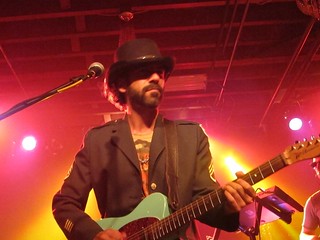
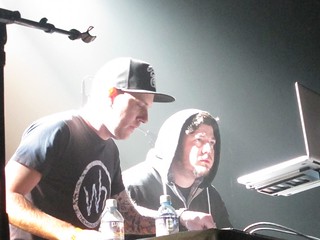
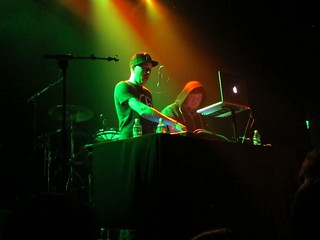
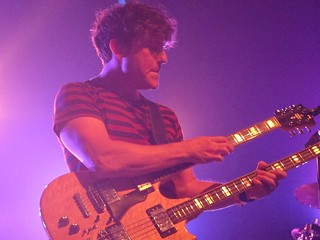
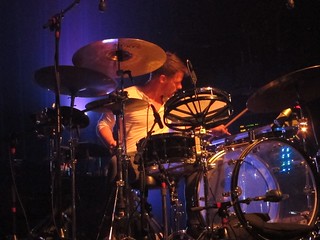
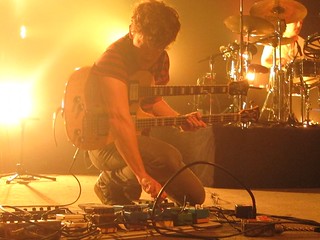
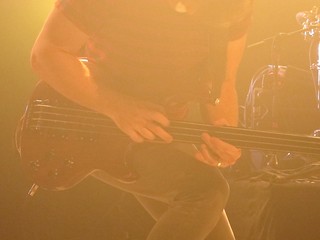
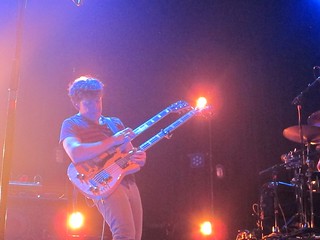

 I really want to love
I really want to love  Grizzled and defiant, Bruce Springsteen could be a character in one of his own songs. In this case, it would feature a man looking back on his career. By the end, he’d discover and prove his continued relevance. High Hopes does just that as it resurrects a collection of reworked tunes and album outtakes and, with help from Rage Against the Machine’s Tom Morello, infuses them with immediacy. The album is both immensely satisfying and somewhat frustrating. It’s a joy to hear Springsteen sound so invigorated, but focusing on older material gives the project a retrospective spin. Two of the strongest pieces, “American Skin (41 Shots)” and “The Ghost of Tom Joad”, have each been previously released in other versions. That leaves dedicated followers no choice but to ruefully shrug and accept some familiar songs instead of an all new album. But more casual fans won’t necessarily recognize them and they’ll appreciate the record as a powerful showcase for Springsteen’s favorite theme of ordinary people finding strength to face adversity.
Grizzled and defiant, Bruce Springsteen could be a character in one of his own songs. In this case, it would feature a man looking back on his career. By the end, he’d discover and prove his continued relevance. High Hopes does just that as it resurrects a collection of reworked tunes and album outtakes and, with help from Rage Against the Machine’s Tom Morello, infuses them with immediacy. The album is both immensely satisfying and somewhat frustrating. It’s a joy to hear Springsteen sound so invigorated, but focusing on older material gives the project a retrospective spin. Two of the strongest pieces, “American Skin (41 Shots)” and “The Ghost of Tom Joad”, have each been previously released in other versions. That leaves dedicated followers no choice but to ruefully shrug and accept some familiar songs instead of an all new album. But more casual fans won’t necessarily recognize them and they’ll appreciate the record as a powerful showcase for Springsteen’s favorite theme of ordinary people finding strength to face adversity.
 Memory and loss cannot be separated. Less a hymn than a classical ballade,
Memory and loss cannot be separated. Less a hymn than a classical ballade, 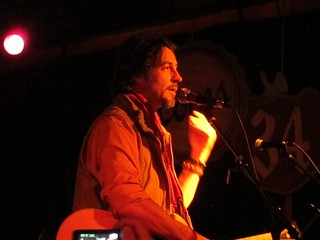
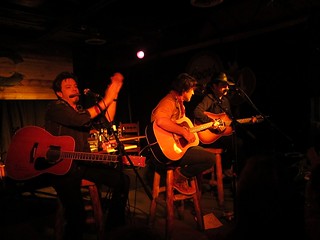
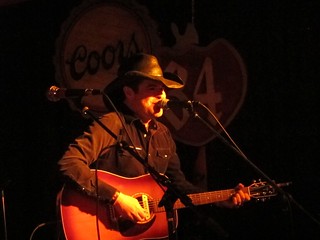
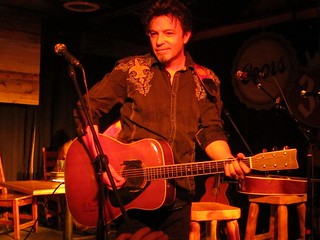

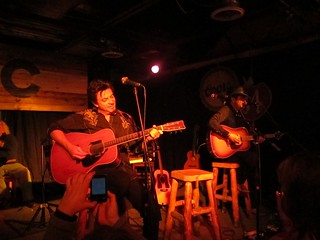
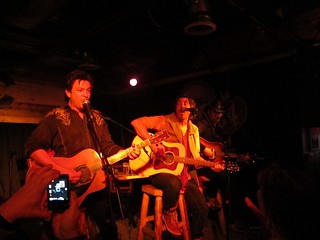

 The psychoactive duo behind
The psychoactive duo behind  Great music transcends technique.
Great music transcends technique.